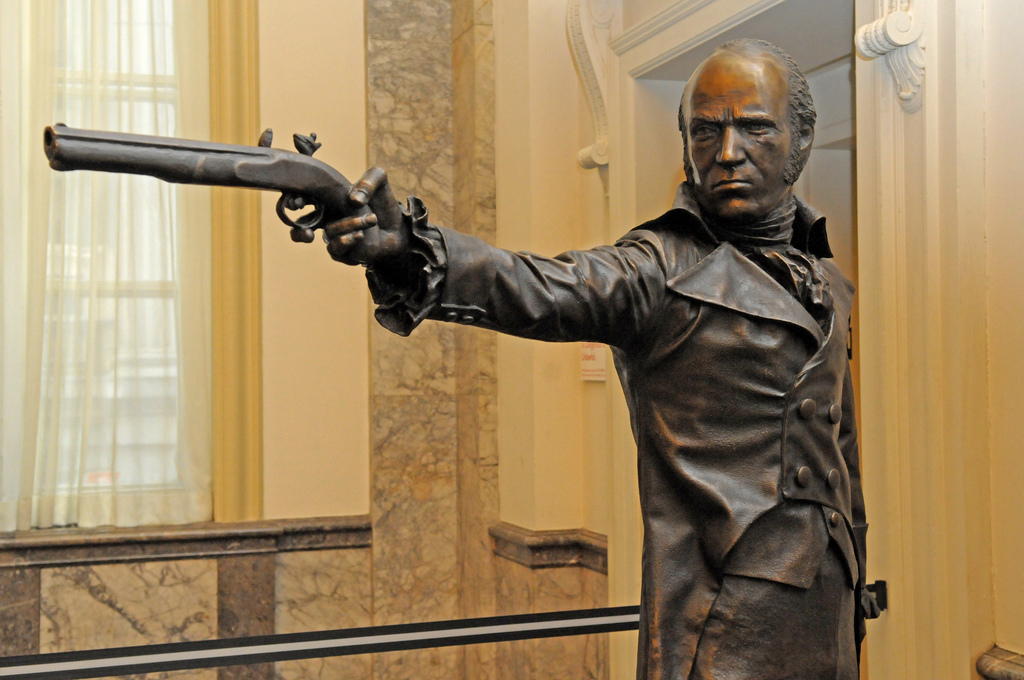The Sunset of the Vice President

Aaron Burr, the last Vice President elected before the tenth amendment.
Ever since the Vice President changed from being the President’s most popular opponent to the President’s partner—with the passing of the twelfth amendment in 1804—the Vice President’s job has faded.
It occurred to me that, rather than having all laws automatically sunset after a period of time, they could become eligible for removal after that period of time, but that an elected official would be responsible for going through the laws and choosing which haven’t done what they set out to do. It should be an official whose popularity then hinges on what they repeal, rather than what they enact.
The Vice President might make a good choice for that position, as the Vice President doesn’t actually have much in the way of official responsibilities. Ties in the Senate are pretty rare and while the Vice President can preside over the Senate, there’s not actually a lot of responsibility there. The Vice President’s arguably most critical duty, the 25th amendment power to get the cabinet together and declare the President “unable to discharge the powers and duties of his office” is one that so far has never been invoked.
A Law1 becomes eligible for repeal by the Vice President seven years after it becomes a Law or after two thirds of the State Legislatures petition the Vice President for repeal of the Law. The Vice President must report these Laws to Congress and the States. Congress may, within sixty days, block repeal with a two-thirds vote in each House. Alternatively, two-thirds of State Legislatures can vote to block repeal within 120 days. If repeal is not blocked by Congress or by the several States, the Law is repealed 120 days after the Vice President reports its repeal.
This provision does not apply to Laws whose sole purpose is the repeal another Law.
Congress would of course be free to re-pass the law, but this would open the law up for debate again, and there would be a better chance of learning from the failure of the first go-round. It is a lot easier to acknowledge the need for change once the original is gone.
There aren’t a lot of provisions in United States law for reducing the scope of the federal government. We need a few. And this would give the Vice President an answer to the perennial question, “what did you accomplish while you were veep?”
It would also make Vice Presidential debates a whole lot more interesting.
In response to Essential Revolution: The Return of the Republicans: The crime of the day is when you do it again.
I’m making the assumption here that Laws as referenced in the constitution are those Bills that have become Laws. It’s important that only full laws as passed by congress be repealable. Piecemeal repeal would be more complex, and the proposal here is to reduce complexity. So if there exists a more precise term of art, such as Act or Bill, it should be used; but I couldn’t find one.
↑
- Amendments to the United States Constitution
- The eleventh through twenty-second amendments to the United States Constitution.
- Article I
- Article One of the U.S. Constitution sets up the Congress, how to elect them, and the duties of the Senate and House of Representatives.
More reigning in bad laws
- A one-hundred-percent rule for traffic laws
- Laws should be set at the point at which we are willing and able to jail 100% of offenders. We should not make laws we are unwilling to enforce, nor where we encourage lawbreaking.
- A free market in union representation
- Every monopoly is said to be special, that this monopoly is necessary. And yet every time, getting rid of the monopoly improves service, quality, and price. There is no reason for unions to be any different.
- Bipartisanship in the defense of big government
- We’ve got to protect our phony-baloney jobs. Despite their complaints about Trump’s overreach, Democrats have introduced legislation to make it harder for them to block his administration’s regulations.
- The Last Defense against Donald Trump?
- When you’ve dismantled every other defense, what’s left except the whining? The fact is, Democrats can easily defend against Trump over-using the power of the presidency. They don’t want to, because they want that power intact when they get someone in.
- The pseudo-scientific state and other evils
- In 1922, following the first world war, G.K. Chesterton discovered to his dismay that the evils of the scientifically-managed state had not been killed by its application in Prussia. Unfortunately, it was also not killed by its applications in Nazi Germany.
- 20 more pages with the topic reigning in bad laws, and other related pages
More sunset laws
- Stop the rot—with sunlight and sunset
- If reform conservatism needs an anticorruption agenda, what structural changes should be on that agenda?
- Essential revolution: lasting reform
- The most important reform is the reform that makes the reformer obsolete.
- The curse of modern legislation
- What would happen if our representatives actually read bills before voting on them?

